- Home
- Michael Ondaatje
The Cinnamon Peeler
The Cinnamon Peeler Read online
FIRST VINTAGE INTERNATIONAL EDITION, JANUARY 1997
Copyright © 1989, 1991 by Michael Ondaatje
All rights reserved under International and Pan-American Copyright Conventions. Published in the United States by Vintage Books, a division of Random House, Inc., New York. Originally published in slightly different form in Great Britain by Pan Books Ltd., London, in hardcover in 1989 and subsequently in the United States by Alfred A. Knopf, Inc., New York, in hardcover in 1991, and in paperback in 1992. Published simultaneously in Canada by McClelland and Stewart, Inc., Toronto.
Most of the poems in this collection were originally published in There’s a Trick with a Knife I’m Learning to Do (1979) and Secular Love (1984), published by W. W. Norton & Company, Inc.
Copyright © 1979 by Michael Ondaatje
Copyright © 1984 by Michael Ondaatje
The Library of Congress has cataloged
the Knopf edition(s) as follows:
Ondaatje, Michael, 1943–
The cinnamon peeler: poems/Michael Ondaatje.—1st ed.
p. cm.
I. Title.
PR9199.3.O5C5 1991
811’.54—dc20 90–53557
Vintage eISBN: 978-0-307-94896-0
Author photograph © Dominic Sansoni
v.3.1
For Barrie Nichol
Contents
Cover
Title Page
Copyright
Dedication
There’s a Trick with a Knife I’m Learning to do
Light
Early Morning, Kingston to Gananoque
A House Divided
The Diverse Causes
Signature
Henri Rousseau and Friends
Application for a driving licence
The Time Around Scars
For John, Falling
The Goodnight
Philoctetes on the Island
Elizabeth
Dates
Billboards
Letters and Other Worlds
Griffin of the Night
Birth of Sound
We’re at the Graveyard
Near Elginburg
Loop
Heron Rex
Rat Jelly
King Kong Meets Wallace Stevens
‘The Gate in his Head’
Taking
Burning Hills
Charles Darwin Pays a Visit, December 1971
The Vault
White Dwarfs
The Agatha Christie Books by the Window
Country Night
Moving Fred’s Outhouse/Geriatrics of Pine
Buck Lake Store Auction
Farre Off
Walking to Bellrock
Pig Glass
The Hour of Cowdust
The Palace
Uswetakeiyawa
The Wars
Sweet Like a Crow
Late Movies with Skyler
Sallie Chisum/Last Words on Billy the Kid. 4 a.m
Pure Memory/Chris Dewdney
Bearhug
Elimination Dance (An Intermission)
Secular Love
Claude Glass
Tin Roof
Rock Bottom
Skin Boat
Her House
The Cinnamon Peeler
Women Like You
The River Neighbour
To a Sad Daughter
All Along the Mazinaw
Pacific Letter
A Dog in San Francisco
Translations of My Postcards
7 or 8 Things I Know About Her
Bessie Smith at Roy Thomson Hall
The Concessions
Red Accordion—an immigrant song
In a Yellow Room
When You Drive the Queensborough Roads at Midnight
Proust in the Waters
Escarpment
Birch Bark
Breeze
There’s a trick
with a knife
I’m learning to do
‘Deep colour and big, shaggy nose. Rather a jumbly, untidy sort of wine, with fruitiness shooting off one way, firmness another, and body pushing about underneath. It will be as comfortable and comforting as the 1961 Nuits St Georges when it has pulled its ends in and settled down.’
MAGAZINE DESCRIPTION OF A WINE
LIGHT
for Doris Gratiaen
Midnight storm. Trees walking off across the fields in fury
naked in the spark of lightning.
I sit on the white porch on the brown hanging cane chair
coffee in my hand midnight storm midsummer night.
The past, friends and family, drift into the rain shower.
Those relatives in my favourite slides
re-shot from old minute photographs so they now stand
complex ambiguous grainy on my wall.
This is my Uncle who turned up for his marriage
on an elephant. He was a chaplain.
This shy looking man in the light jacket and tie was infamous,
when he went drinking he took the long blonde beautiful hair
of his wife and put one end in the cupboard and locked it
leaving her tethered in an armchair.
He was terrified of her possible adultery
and this way died peaceful happy to the end.
My Grandmother, who went to a dance in a muslin dress
with fireflies captured and embedded in the cloth, shining
and witty. This calm beautiful face
organized wild acts in the tropics.
She hid the milkman in her house
after he had committed murder and at the trial
was thrown out of the court for making jokes at the judge.
Her son became a Q.C.
This is my brother at 6. With his cousin and his sister
and Pam de Voss who fell on a penknife and lost her eye.
My Aunt Christie. She knew Harold Macmillan was a spy
communicating with her through pictures in the newspapers.
Every picture she believed asked her to forgive him,
his hound eyes pleading.
Her husband, Uncle Fitzroy, a doctor in Ceylon,
had a memory sharp as scalpels into his 80’s,
though I never bothered to ask him about anything
– interested then more in the latest recordings of Bobby Darin.
And this is my Mother with her brother Noel in fancy dress.
They are 7 and 8 years old, a hand-coloured photograph,
it is the earliest picture I have. The one I love most.
A picture of my kids at Halloween
has the same contact and laughter.
My Uncle dying at 68, and my Mother a year later dying at 68.
She told me about his death and the day he died
his eyes clearing out of illness as if seeing
right through the room the hospital and she said
he saw something so clear and good his whole body
for a moment became youthful and she remembered
when she sewed badges on his trackshirts.
Her voice joyous in telling me this, her face light and clear.
(My firefly Grandmother also dying at 68).
These are the fragments I have of them, tonight
in this storm, the dogs restless on the porch.
They were all laughing, crazy, and vivid in their prime.
At a party my drunk Father
tried to explain a complex operation on chickens
and managed to kill them all in the process, the guests
having dinner an hour later while my Father slept
and the kids watched the servants clean up the litte
r
of beaks and feathers on the lawn.
These are their fragments, all I remember,
wanting more knowledge of them. In the mirror and in my kids
I see them in my flesh. Wherever we are
they parade in my brain and the expanding stories
connect to the grey grainy pictures on the wall,
as they hold their drinks or 20 years later
hold grandchildren, pose with favourite dogs,
coming through the light, the electricity, which the storm
destroyed an hour ago, a tree going down by the highway
so that now inside the kids play dominoes by candlelight
and out here the thick rain static the spark of my match
to a cigarette
and the trees across the fields leaving me, distinct
lonely in their own knife scars and cow-chewed bark
frozen in the jagged light as if snapped in their run
the branch arms waving to what was a second ago the dark sky
when in truth like me they haven’t moved.
Haven’t moved an inch from me.
EARLY MORNING, KINGSTON
TO GANANOQUE
The twenty miles to Gananoque
with tangled dust blue grass
burned, and smelling burned
along the highway
is land too harsh for picnics.
Deep in the fields
behind stiff dirt fern
nature breeds the unnatural.
Escaping cows canter white
then black and white
along the median, forming out of mist.
Crows pick at animal accidents,
with swoops lift meals—
blistered groundhogs, stripped snakes
to arch behind a shield of sun.
Somewhere in those fields
they are shaping new kinds of women.
A HOUSE DIVIDED
This midnight breathing
heaves with no sensible rhythm,
is fashioned by no metronome.
Your body, eager
for the extra yard of bed,
reconnoitres and outflanks;
I bend in peculiar angles.
This nightly battle is fought with subtleties:
you get pregnant, I’m sure,
just for extra ground
– immune from kicks now.
Inside you now’s another,
thrashing like a fish,
swinging, fighting
for its inch already.
THE DIVERSE CAUSES
for than all erbys and treys renewyth a man and woman,
and in lyke wyse lovers callyth to their mynde olde
jantylnes and olde servyse, and many kynde dedes that
was forgotyn by necylgence
Three clouds and a tree
reflect themselves on a toaster.
The kitchen window hangs scarred,
shattered by winter hunters.
We are in a cell of civilized magic.
Stravinsky roars at breakfast,
our milk is powdered.
Outside, a May god
moves his paws to alter wind
to scatter shadows of tree and cloud.
The minute birds walk confident
jostling the cold grass.
The world not yet of men.
We clean buckets of their sand
to fetch water in the morning,
reach for winter cobwebs,
sweep up moths who have forgotten to waken.
When the children sleep, angled
behind their bottles, you can hear mice prowl.
I turn a page
careful not to break the rhythms
of your sleeping head on my hip,
watch the moving under your eyelid
that turns like fire,
and we have love and the god outside
until ice starts to limp
in brown hidden waterfalls,
or my daughter burns the lake
by reflecting her red shoes in it.
SIGNATURE
The car carried him
racing the obvious moon
beating in the trees like a white bird.
Difficult to make words sing
around your appendix.
The obvious upsets me,
everyone has scars which crawl
into the mystery of swimming trunks.
I was the first appendix in my family.
My brother who was given the stigma
of a rare blood type
proved to have ulcers instead,
The rain fell like applause as I approached the hospital.
It takes seven seconds she said,
strapped my feet,
entered my arm.
I stretched all senses
on five
the room closed on me like an eyelid.
At night the harmonica plays,
a whistler joins in respect.
I am a sweating marble saint
full of demerol and sleeping pills.
A man in the armour of shining plaster
walks to my door, then past.
Imagine the rain
falling like white bees on the sidewalk
imagine Snyder
high on poetry and mountains
Three floors down
my appendix
swims in a jar.
O world, I shall be buried all over Ontario
HENRI ROUSSEAU AND FRIENDS
for Bill Muysson
In his clean vegetation
the parrot, judicious,
poses on a branch.
The narrator of the scene,
aware of the perfect fruits,
the white and blue flowers,
the snake with an ear for music;
he presides.
The apes
hold their oranges like skulls,
like chalices.
They are below the parrot
above the oranges—
a jungle serfdom which
with this order
reposes.
They are the ideals of dreams.
Among the exactness,
the symmetrical petals,
the efficiently flying angels,
there is complete liberation.
The parrot is interchangeable;
tomorrow in its place
a waltzing man and tiger,
brash legs of a bird.
Greatness achieved
they loll among textbook flowers
and in this pose hang
scattered like pearls
in just as intense a society.
On Miss Adelaide Milton de Groot’s walls,
with Lillie P. Bliss in New York.
And there too
in spangled wrists and elbows
and grand façades of cocktails
are vulgarly beautiful parrots, appalled lions,
the beautiful and the forceful locked in suns,
and the slight, careful stepping birds.
APPLICATION FOR A DRIVING LICENCE
Two birds loved
in a flurry of red feathers
like a burst cottonball,
continuing while I drove over them.
I am a good driver, nothing shocks me.
THE TIME AROUND SCARS
A girl whom I’ve not spoken to
or shared coffee with for several years
writes of an old scar.
On her wrist it sleeps, smooth and white,
the size of a leech.
I gave it to her
brandishing a new Italian penknife.
Look, I said turning,
and blood spat onto her shirt.
My wife has scars like spread raindrops
on knees and ankles,
she talks of broken greenhouse panes
and yet, apart from imagining red feet,
(a nymph out of Chagall)
I bring little to that scene.
We remember the time around scars,
they freeze irrelevant emotions
and divide us from present friends.
I remember this girl’s face,
the widening rise of surprise.
And would she
moving with lover or husband
conceal or flaunt it,
or keep it at her wrist
a mysterious watch.
And this scar I then remember
is medallion of no emotion.
I would meet you now
and I would wish this scar
to have been given with
all the love
that never occurred between us.
FOR JOHN, FALLING
Men stopped in the heel of sun,
hum of engines evaporated;
the machine displayed itself bellied with mud
and balanced – immense.
No one ran to where
his tensed muscles curled unusually,
where jaws collected blood,
the hole in his chest the size of fists,
hands clutched to eyes like a blindness.
Arched there he made
ridiculous requests for air.
And twelve construction workers
what should they do but surround
or examine the path of falling.
And the press in bright shirts,
a doctor, the foreman scuffing a mound,
men. removing helmets,
the machine above him
shielding out the sun
while he drowned
in the dark orgasm of his mouth.
THE GOODNIGHT
With the bleak heron Paris
imagine Philoctetes
the powerful fat-thighed man,
the bandaged smelling foot
with rivers of bloodshot veins
scattering like trails into his thighs:

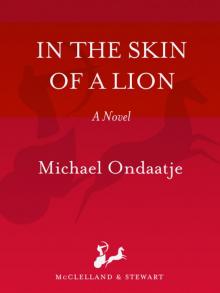 In the Skin of a Lion
In the Skin of a Lion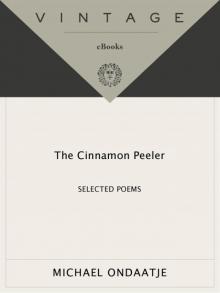 The Cinnamon Peeler
The Cinnamon Peeler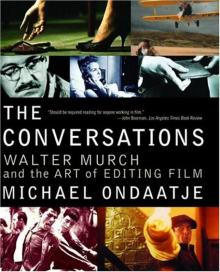 The Conversations: Walter Murch and the Art of Editing Film
The Conversations: Walter Murch and the Art of Editing Film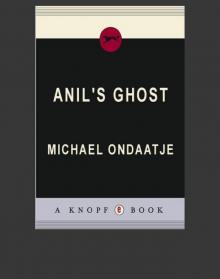 Anil's Ghost
Anil's Ghost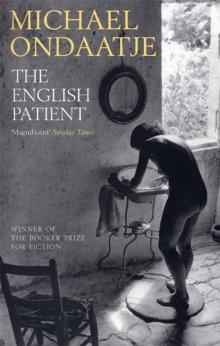 The English Patient
The English Patient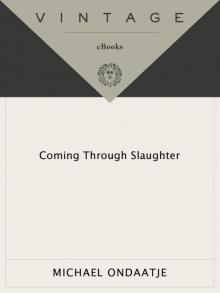 Coming Through Slaughter
Coming Through Slaughter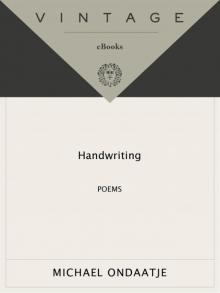 Handwriting
Handwriting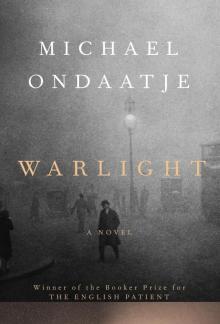 Warlight
Warlight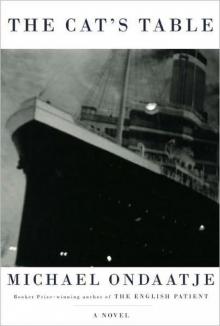 The Cat's Table
The Cat's Table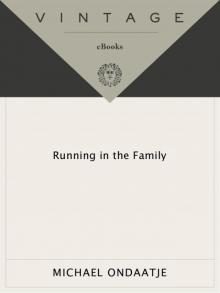 Running in the Family
Running in the Family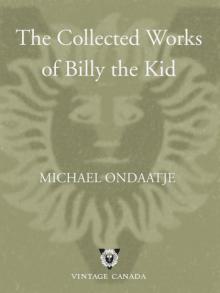 The Collected Works of Billy the Kid
The Collected Works of Billy the Kid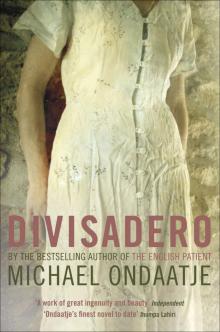 Divisadero
Divisadero